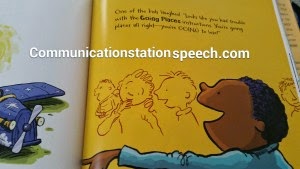It's Tip Tuesday and since I receive questions about facilitating and eliciting language in very young children often from parents all over the world I thought I'd do a series offering tips and techniques I have done (and still do) with my own kiddos to get them talking! You will notice there will be very few speech pathology terms used here as the goal of this series is to speak directly to parents. However this information can be used by SLPs, early interventionists, or early childhood educators as well. These tips are targeted for children 0-3 yrs (or cognitive equivalent).
Here's Tip #3 (you can find Tip #2 here).
Bring attention to your face. So much verbal and nonverbal communication is done with our faces. Bringing attention to the central source of communication when your child is just learning the ins and outs of social skills, provides a simple way you can feel connected with your child while modeling the many things you can do with just your face.
How can I bring attention to my face? What should I be doing? You can really do anything that is entertaining to your baby and encourages sustained attention. So, make silly faces, open your mouth wide, stick out your tongue, play with early developing sounds "ba", "ma", "da", "wa", etc. Repeat these sounds with a variety of intonation illustrating a conversation. I call this playing "face games" with your baby.
Tip: The easiest way for me to do this with my own children is to lay my babies down on my lap so they when they are looking up they have no choice but to be looking at me and focusing on my face rather than on toys or the surrounding environment.
Why it works? By bringing attention to your face you are showing your baby there are things we can do with our faces (seems pretty logical, right?). When acting silly, your baby will find enjoyment in your face and in this type of play. When producing sounds, you are modeling the babbling that is to come from your baby as he/she develops. You are showing him/her that he/she can talk too and that talking is fun! It's also imperative to have these moments of social connection with your infant as it teaches your child joint attention as well as a number of other nonverbal language skills such as making and maintaining eye contact, social smile, oral motor imitation, etc..
Tip: I often tell parents that I work with, if this feels unnatural for you to do, take a few minutes every day after you brush your teeth or get out of the shower and make silly/funny faces to yourself in the mirror, while pretending you are talking to your baby. After four or five days of this, you'll be ready to play face games with your baby.
Check out Tip #4 here!
Happy talking!







